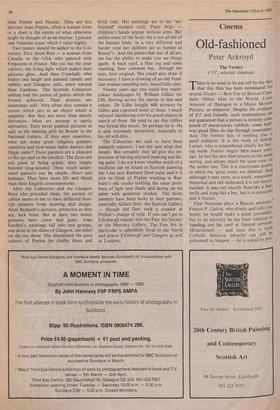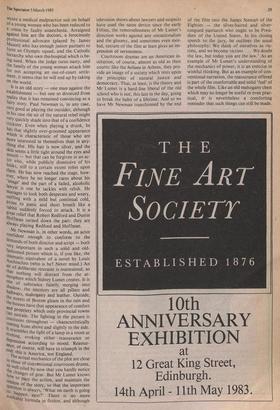Cinema
Old-fashioned
Peter Ackroyd
The Verdict
('15', selected cinemas) There is no need to be put off by the fact that this film has been nominated for several Oscars — Best Use of Boston Com- mon, Oldest Idea in the World, Least Amount of Dialogue in a Major Motion Picture, or whatever. Despite the evidence of ET and Gandhi, such nominations do not guarantee that a picture is entirely cola posed of meretricious rubbish: some half- way good films do slip through sometimes. And The Verdict has, if nothing else, a good pedigree. It is the work of Sidney Lumet, who is remembered chiefly for hav- ing made Twelve Angry Men many years ago. In fact his new film returns to the same setting, and adopts much the same tone, as the earlier one. This is a courtroom drama in which the 'great issues are debated. And although it may seem, as a result, somewhat theatrical and old-fashioned it is not heaVY- handed. It may not exactly float like a but- terfly and sting like a bee, but it is colourful and it buzzes.
Paul Newman plays a Boston attorneY, Francis P. Galvin, who drinks and talks too much; he would make a good journalist, but as an attorney he has been reduced to handing out his card at funeral services. Miraculously — and since this is Irish Catholic America, miracles can still be presumed to happen — he is asked to Pro"
secute a medical malpractice suit on behalf of a young woman who has been reduced to a coma by faulty anaesthesia. Arraigned against him are the doctors, a ferociously Professional advocate (played by James Mason) who has enough junior partners to form an Olympic squad, and the Catholic hierarchy who own the.hospital which is be- ing sued. When the judge turns nasty, and the family of the young woman attack him for not accepting an out-of-court settle- ment, it seems that he will end up by taking on the world.
It is an old story — one man against the establishment — but one so divorced .from
reality that it has remained convincing as a
fairy story. Paul Newman is, in any case, very good at playing the outsider, although in his case the air of the natural rebel might very quickly shade into that of a confidence trickster. Even when playing a drunk, he
has that slightly over-groomed appearance whith is characteristic of those who are More interested in themselves than in any-
thing else. His hair is now silver, -and• the
Skin seems a little tight around the eyes and mouth — but that can be forgiven in an ac- tor who, while publicly dismissive of his looks, still to a certain extent relies upon them. He has now reached the stage, how- ever, where he no longer cares about his
'Image' and the part of a failed, alcoholic lawyer is one he tackles with relish. He
manages to look both desperate and weary, sniffing with a mild but continual cold, Prone to panic and short breath like a
rabbit suddenly forced to attack. It is a great relief that Robert Redford and Dustin Hoffman turned down the part: they are always playing Redford and Hoffman.
Mr Newman is, in other words, an actor confident enough to conform to the
demands of both director and script — both
v_ery important in such a solid and old- fashioned picture which is, if you like, the cinematic equivalent of a novel by Louis
Auchincloss (who is he? Never mind.) An air of deliberate restraint is maintained, so that nothing will distract from the at- mosphere which Sidney Lumet creates. It is °Ile of substance faintly merging into Shadow: the interiors are all pillars and
a, mahogany and leather. Outside, the streets of Boston gleam in the rain and the houses have that appearance of comfort
and Propriety which only provincial towns
can sustain. The lighting in the picture is consistent throughout — characteristically
coming from above and slightly to the side. resembles the light of a lamp in a room at evening, evoking either reassurance or depression according to mood. Reassur- ance, of course, will have to triumph in the end: this is America, not England.
The actual mechanics of the plot are close to those of conventional courtroom drama, SO
well oiled by now that you hardly notice h`ne changes of gear. But Mr Lumet knows cl „, W to Pace the action, and maintain the t n'',.11sion of the story, so that the important mtouestion is always, 'What on earth is going haPPen next?' There is no more "urkable.formula in fiction, and although
television shows about lawyers and suspeCts have used the same device since the early Fifties, the remorselessness of Mr Lumet's direction works against any sensationalism and the gloomy, and sometimes even mor- bid, texture of the film at least gives an im- pression of seriousness.
Courtroom dramas are an American in- stitution, of course, almost as old as their courts: like the heliaea in Athens, they pro- vide an image of a society which rests upon the principles of natural justice and democracy. That, at least, is the theory and Mr Lumet is a hard-line liberal of the old school who is not, this late in the day, going to break the habit of a lifetime. And so we have Mr Newman transformed by the end
of the film into the James Stewart of the Eighties — the silver-haired and silver- tongued patriarch who ought to be Presi- dent of the United States. In his closing speech to the jury, he outlines the usual philosophy: We think of ourselves as vic- tims, and we become victims ... We doubt the law, but today you are the law.' As an example of Mr Lumet's understanding of the mechanics of power, it is an exercise in wishful thinking. But as an example of con- ventional narration, the reassurance offered is part of the comfortable and solid 'feel' of the whole film. Like an old mahogany chest which may no longer be useful or even prac- tical, it is nevertheless a comforting reminder that such things can still be made.















































 Previous page
Previous page